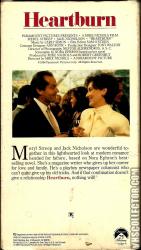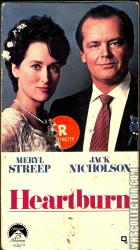Heartburn
Catalog Number
1688
-
Primary Distributor (If not listed, select "OTHER")
Catalog Number
1688
Primary Distributor (If not listed, select "OTHER")
Release Year
Country
N/A (NTSC)
N/A | N/A | N/A
N/A | N/A
Heartburn (1986)
Additional Information
Additional Information
Sex... Love... Marriage. Some people don't know when to quit!
So This Is Love?
They Thought It Was Love. It Was Really Heartburn.
Though she always played coy about the fact in interviews, Nora Ephron's novel Heartburn is a thinly disguised "à clef" rehash of her marriage to Washington Post reporter Carl Bernstein. Meryl Streep plays Rachel, an influential food critic who marries charismatic columnist Mark (Jack Nicholson) after a whirlwind courtship. Warned that Mark is constitutionally incapable of settling down with any one woman, Rachel gives up her own job to make certain that her marriage works. When Rachel announces that she's pregnant, Mark virtually jumps out of his skin with delight. But as the news sinks in, Mark chafes at the impending responsibilities of fatherhood, and the philandering begins -- as if it had ever really stopped! Our favorite scene: Rachel and her friends being robbed at her therapy group -- that's Kevin Spacey as the robber, in his film debut. Meryl Streep's real-life child Mamie Gummer also appeared in the film as Rachel's daughter.
Heartburn is a 1986 American drama film directed by Mike Nichols and starring Meryl Streep, Jack Nicholson, Stockard Channing, Jeff Daniels and Miloš Forman. The screenplay by Nora Ephron is based on her semi-autobiographical novel of the same name, which was inspired by her tempestuous second marriage to Carl Bernstein and his affair with Margaret Jay.
The story is about is a magazine's food writer who meets a Washington newspaper columnist at a wedding. They become happily married until she discovers her husband is having an affair.
It is Nicholson's and Streep's first film together (they later co-starred in 1987's Ironweed) and is also Kevin Spacey's film debut in a brief appearance as a street thug.
Roger Ebert of the Chicago Sun-Times called it "a bitter, sour movie about two people who are only marginally interesting" and placed much of the blame on screenwriter Nora Ephron, who "should have based her story on somebody else's marriage. That way, she could have provided the distance and perspective that good comedy needs." He felt "she apparently had too much anger to transform the facts into entertaining fiction."[4]
Variety thought it was "a beautifully crafted film with flawless performances and many splendid moments, yet the overall effect is a bit disappointing" and added, "While the day-to-day details are drawn with a striking clarity, Ephron's script never goes much beyond the mannerisms of middle-class life. Even with the sketchy background information, it's hard to tell what these people are feeling or what they want."[5]
Pauline Kael of The New Yorker wrote: "The movie is full of talented people, who [...] are fun to watch, but after a while the scenes that don't point anywhere begin to add up, and you start asking yourself: 'What is this movie about?' You are still asking when it's over, and by then a flatness, a disappointment, is likely to have settled ovet the fillips you'd enjoyed," noting that "[t]hough Ephron is a gifted and a witty light essayist, her novel is no more than a variant of a princess fantasy: Rachel, the wife, is blameless; Mark, the husband, is simply a bad egg—an adulterer. And, reading the book, you don't have to take Rachel the bratty narrator very seriously; her self-pity is so thinly masked by humor and unabashed mean-spiritedness that you feel that the author is exploiting her life—trashing it by presenting it as a juicy, fast-action comic strip about a marriage of celebrities."[6]
Release Date: July 25, 1986
Distrib: Paramount
Boxoffice: $25,314,189 2014: $56,974,000
So This Is Love?
They Thought It Was Love. It Was Really Heartburn.
Though she always played coy about the fact in interviews, Nora Ephron's novel Heartburn is a thinly disguised "à clef" rehash of her marriage to Washington Post reporter Carl Bernstein. Meryl Streep plays Rachel, an influential food critic who marries charismatic columnist Mark (Jack Nicholson) after a whirlwind courtship. Warned that Mark is constitutionally incapable of settling down with any one woman, Rachel gives up her own job to make certain that her marriage works. When Rachel announces that she's pregnant, Mark virtually jumps out of his skin with delight. But as the news sinks in, Mark chafes at the impending responsibilities of fatherhood, and the philandering begins -- as if it had ever really stopped! Our favorite scene: Rachel and her friends being robbed at her therapy group -- that's Kevin Spacey as the robber, in his film debut. Meryl Streep's real-life child Mamie Gummer also appeared in the film as Rachel's daughter.
Heartburn is a 1986 American drama film directed by Mike Nichols and starring Meryl Streep, Jack Nicholson, Stockard Channing, Jeff Daniels and Miloš Forman. The screenplay by Nora Ephron is based on her semi-autobiographical novel of the same name, which was inspired by her tempestuous second marriage to Carl Bernstein and his affair with Margaret Jay.
The story is about is a magazine's food writer who meets a Washington newspaper columnist at a wedding. They become happily married until she discovers her husband is having an affair.
It is Nicholson's and Streep's first film together (they later co-starred in 1987's Ironweed) and is also Kevin Spacey's film debut in a brief appearance as a street thug.
Roger Ebert of the Chicago Sun-Times called it "a bitter, sour movie about two people who are only marginally interesting" and placed much of the blame on screenwriter Nora Ephron, who "should have based her story on somebody else's marriage. That way, she could have provided the distance and perspective that good comedy needs." He felt "she apparently had too much anger to transform the facts into entertaining fiction."[4]
Variety thought it was "a beautifully crafted film with flawless performances and many splendid moments, yet the overall effect is a bit disappointing" and added, "While the day-to-day details are drawn with a striking clarity, Ephron's script never goes much beyond the mannerisms of middle-class life. Even with the sketchy background information, it's hard to tell what these people are feeling or what they want."[5]
Pauline Kael of The New Yorker wrote: "The movie is full of talented people, who [...] are fun to watch, but after a while the scenes that don't point anywhere begin to add up, and you start asking yourself: 'What is this movie about?' You are still asking when it's over, and by then a flatness, a disappointment, is likely to have settled ovet the fillips you'd enjoyed," noting that "[t]hough Ephron is a gifted and a witty light essayist, her novel is no more than a variant of a princess fantasy: Rachel, the wife, is blameless; Mark, the husband, is simply a bad egg—an adulterer. And, reading the book, you don't have to take Rachel the bratty narrator very seriously; her self-pity is so thinly masked by humor and unabashed mean-spiritedness that you feel that the author is exploiting her life—trashing it by presenting it as a juicy, fast-action comic strip about a marriage of celebrities."[6]
Release Date: July 25, 1986
Distrib: Paramount
Boxoffice: $25,314,189 2014: $56,974,000






Comments0
Login / Register to post comments